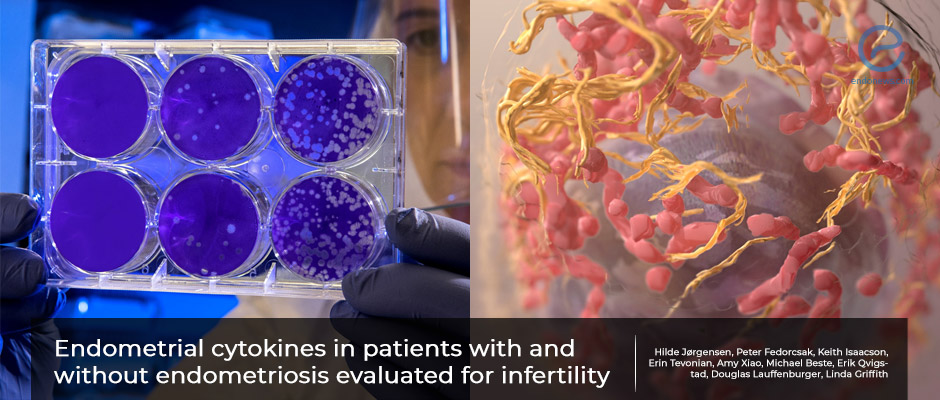The Role of Endometrial Cytokines on the Infertility in Endometriosis Patients
Mar 1, 2022
A subset of different cytokines are altered in the endometrium of women with endometriosis, study suggests
Key Points
Highlight
- Endometriosis patients might be distinguished from others with the presence of uterine natural killer cells in the endometrial tissue.
Importance
- Certain cytokines, chemokines, and growth factors contribute to the endometriosis pathogenesis and are specific to the endometrial tissue of endometriosis patients.
- Proving a difference in the intrauterine immunological microenvironment in endometriosis patients might shed some light on the understanding of the disease pathogenesis.
What's done here
- This is a prospective cohort study of 74 patients with infertility.
- It aimed to evaluate whether immunological properties play a role in infertility in patients with and without endometriosis.
- After obtaining an endometrial biopsy sample from all the patients in a laparoscopic procedure, 48 different cytokines, chemokines, and growth factors were analyzed using multiplex cytokine immunoassay.
- The results were statistically evaluated using univariate and multivariate analyzes.
Key results
- There were a total of 42 patients with endometriosis.
- Endometriosis patients had a lower level of interferon g-induced protein-10 (IP-10), interleukin (IL)-15, and monocyte chemoattractant protein-1 (MCP-1).
- The levels of IL-15, IL-7, and IP-10 were also found lower during the secretory phase in endometriosis patients.
- IP-10, MCP-1, and IL-18 exhibited a negative correlation, and IL-16 a positive correlation in differentiating endometriosis from the control group.
- Endometrial cytokines and fertility outcomes were not correlated.
Limitations
- A relatively small sample size after data curation.
Lay Summary
The intrauterine microenvironment and underlying immunological mechanisms in endometriosis pathogenesis have been a popular research topic, mainly due to the efforts to comprehend the reason to elucidate infertility that these patients suffer from.
Because of their superiority to other immune cells in terms of presence during the endometrial cycle, uterine natural killer cells often attract more attention among all immune cells. They harbor specific functions in homeostasis, embryo implantation, and the continuation of pregnancy. These functions are performed differently from the blood natural killer cells with different cell surface receptors. With their role being so crucial in the upkeep of uterine function, the possible changes in the disease state have become an area of interest.
Dr.Griffith the USA lead and conducted a prospective cohort study with scientists from Norway to evaluate whether immunological properties play a role in infertility in patients with and without endometriosis. The study was published in the March 2022 issue of the journal Fertility and Sterility. Cytokines, chemokines, and growth factors were broadly analyzed in endometrial biopsy specimens of 74 patients who underwent laparoscopy to determine the cause of infertility. The patients were followed up for six months to evaluate the fertility outcome. A multiplex cytokine immunoassay of 48 different cytokines, chemokines, and growth factors was performed, and data curation was done by comparing the median fluorescence intensity values and DNA concentration. The results were assessed using univariate and multivariate analyzes.
Of these 74 patients, 42 were found to have endometriosis, and women with endometriosis had lower levels of interferon g-induced protein-10, interleukin (IL)-15, and monocyte chemoattractant protein-1 levels, and during the secretory phase of the endometrial cycle, the levels of IL-7 and 15, and interferon g-induced protein-10 were also found lower; however, these results were not statistically significant. Multivariate analyses showed that IP-10, MCP-1, and IL-18 exhibited a negative correlation, and IL-16 revealed a positive correlation in differentiating endometriosis from the control group independent of cycle and fertility status. Furthermore, IL-15 was also negatively correlated with endometriosis when only secretory phase samples were evaluated. These results suggest a defect in the presence or activity of uterine natural killer cells. The researchers state that this finding supports other studies that reported reduced numbers and maturity of natural killer cells in the endometrial tissue obtained from women with endometriosis. On the other hand, endometrial cytokines and fertility outcomes were not found to be correlated in this study.
In a mini-essay written in the same issue as a reflection on this study, Dr. Bedaiwy stated that even though it is a very well-executed, targeted proteomics study, these results should not be used as a disease classifier. More comprehensive and large sample studies are needed to understand uNK cell dysfunction and use this knowledge in the therapeutic intervention of the disease.
Research Source: https://pubmed.ncbi.nlm.nih.gov/35125185/
endometriosis infertility cytokines uterine natural killer cells

